“Learn to do good, seek justice”
Homily of the Holy Father on the Solemnity of the Conversion of St Paul the Apostle
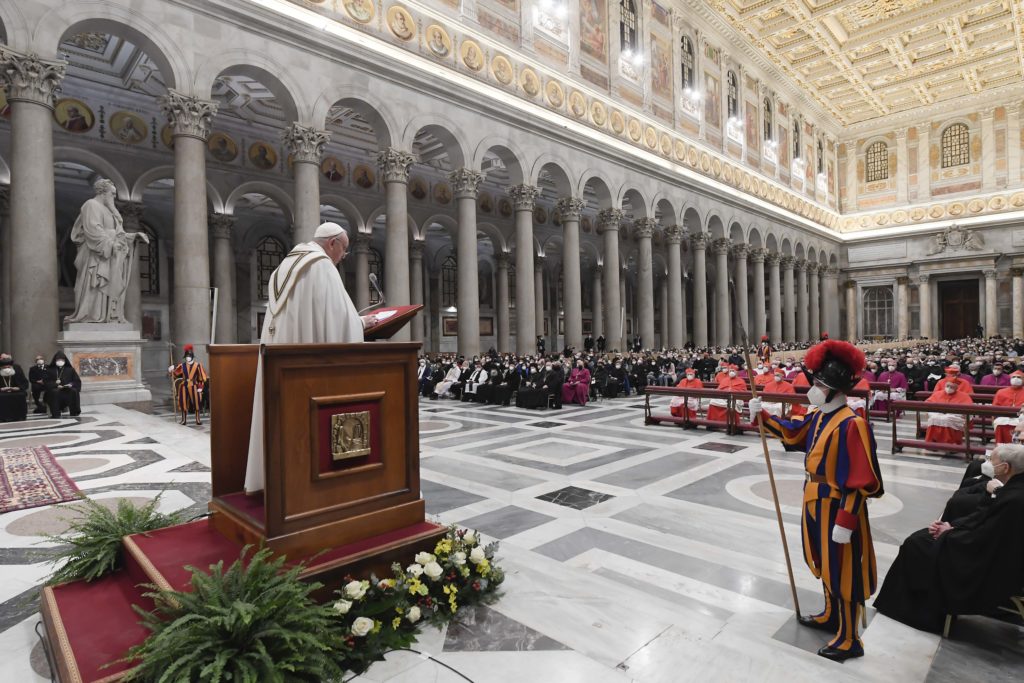
At 5.30 p.m. today, in the Basilica of St Paul Outside the Walls, the Holy Father Francis presided over the celebration of Second Vespers for the Solemnity of the Conversion of St Paul the Apostle, at the conclusion of the 56th Week of Prayer for Christian Unity on the theme: “Learn to do good, seek justice” (Is 1:17).
Representatives of the other Churches and Ecclesial Communities in Rome participated in the celebration.
At the end of Vespers, before the Apostolic Blessing, His Eminence Card. Kurt Koch, Prefect of the Dicastery for the Promotion of Christian Unity, addressed an address of greeting to the Holy Father.
We publish below the text of the homily that Pope Francis delivered during the celebration:
Homily of the Holy Father
We have just heard the word of God, which has inspired this Week of Prayer for Christian Unity. Those words are forceful, so forceful in fact, that they might seem out of place as we celebrate the joy of coming together as brothers and sisters in Christ to celebrate a solemn liturgy in his praise. In these days so full of tragic and troubling news reports, we could perhaps easily dispense with such biblical condemnations of the sins of society! Yet if we are sensitive to the profound unease of the times in which we are living, we should be all the more concerned for what causes suffering to the Lord for whom we live. And since we have gathered in his name, we cannot fail to put his word at the centre of things. That word is prophetic: God, speaking in the voice of Isaiah, admonishes us and urges us to change. Admonishment and change are the two words on which I would like to reflect with you this evening.
1. Admonishment. Let us hear something of what God has to say: “When you come to appear before me…, bringing offerings is futile… When you stretch out your hands, I will hide my eyes from you; even though you make many prayers, I will not listen” (Is 1:12.13.15). What arouses the Lord’s indignation to the point that he rebukes so severely the people whom he loves so greatly? The text reveals two motives. First, he condemns the fact that in his Temple, in his name, one fails to do what he desires: not incense and offerings, but that the poor receive assistance, that justice be rendered to the orphan, that the cause of the widow be upheld (cf. v. 17). In the days of the prophet, and not only then, it was generally thought that the rich, who made great offerings and looked down upon the poor, were blessed in God’s eyes. Yet this was, and is, completely to misunderstand the Lord. It is the poor that Jesus proclaims blessed (cf. Lk 6:20), and in the parable of the final judgment he identifies himself with those who hunger and thirst, the stranger, the needy, the sick and those in prison (cf. Mt 25:35-36). This, then, is the first cause of his indignation: God suffers when we, who call ourselves his faithful ones, put our own ways of seeing things before his, when we follow the judgments of the world rather than those of heaven, when we are content with exterior rituals yet remain indifferent to those for whom he cares the most. God is grieved, we might say, by our indifference and lack of understanding.
In addition to this, there is a second and more serious motive that offends the Most High. It is sacrilegious violence. He tells us: “I cannot endure solemn assemblies with iniquity… Your hands are full of blood… Remove the evil of your doings from before my eyes” (Is 1:13.15.16). The Lord is “moved to wrath”, because of the violence done to the temple of God which is man, even while he is being glorified in the material temples we erect! We can imagine with what suffering he must witness wars and acts of violence perpetrated by those who call themselves Christians. We are reminded of the story of the holy man who protested the brutality of a king by offering him meat during the Lenten season. When the king in the name of piety indignantly refused to accept the gift, the man of God asked him why he had scruples about eating the flesh of animals, while not hesitating to sacrifice the flesh of the children of God.
Brothers and sisters, this admonition of the Lord gives us much food for thought, as individual Christians and as Christian confessions. I would like to state once again that “today, with our developed spirituality and theology, we have no excuses. Still, there are those who appear to feel encouraged or at least permitted by their faith to support varieties of narrow and violent nationalism, xenophobia and contempt, and even the mistreatment of those who are different. Faith, and the humanism it inspires, must maintain a critical sense in the face of these tendencies, and prompt an immediate response whenever they rear their head” (Fratelli Tutti, 86). If, following the example of the Apostle Paul, we desire that the grace of God in us not be in vain (cf. 1 Cor 15:10), we must be opposed to war, to violence and to injustice wherever they begin to appear. The theme of this Week of Prayer was chosen by a group of Christians from Minnesota, conscious of the injustices perpetrated in the past against native peoples and in our own day against African-Americans. Before the various forms of contempt and racism, before indifference, lack of understanding and sacrilegious violence, the word of God admonishes us: “learn to do good, seek justice” (Is 1:17). It is not enough to denounce, we need also to renounce evil, to pass from evil to good. In other words, admonishment is meant to change us.
2. Change. After diagnosing our wrongs, the Lord asks us to remedy them and, through the prophet, tells us: “Wash yourselves; make yourselves clean; cease to do evil” (v. 16). Yet knowing that we are overwhelmed and, as it were, paralyzed by our many sins, he promises that he himself will wash away our sins. “Come now, let us argue it out, says the Lord: though your sins are like scarlet, they shall be like snow; though they are red like crimson, they shall become like wool” (v. 18). Dear friends, due to our failure to understand God and the violence that lurks within us, we are incapable of setting ourselves free. Without God, without his grace, we are not healed of our sin. God’s grace is the source of our change. We see this in the life of the Apostle Paul, whom we commemorate today. By ourselves, we cannot succeed, but with God, all is possible. By ourselves, we do not succeed, but together, it is possible. For the Lord asks his disciples to be converted together. Conversion – a word that is repeated often but not always easily understood – is demanded of the people; it is communitarian and ecclesial in nature. Consequently, we also believe that our ecumenical conversion grows to the extent that we recognize our need for God’s grace, our need for his mercy. In acknowledging that we are dependent on God for everything, we will truly, with his aid, feel and “be one” (Jn 17:21). This is important, brothers and sisters.
What a beautiful thing it is to be open, together, in the grace of the Spirit, to this change of perspective. To rediscover that “all the faithful throughout the world are in communion with each other in the Holy Spirit, so that – as Saint John Chrysostom wrote – ‘those who dwell in Rome knows those in India to be part of the same body’” (Lumen Gentium, 13; In Io. Hom., 65,1). On this journey of fellowship, I am grateful that so many Christians, of various communities and traditions, are accompanying with participation and interest the synodal journey of the Catholic Church, which I trust will become increasingly ecumenical. Let us not forget that journeying together and acknowledging that we are in communion with one another in the Holy Spirit entails a change, the growth that can only take place, as Benedict XVI wrote, “on the basis of an intimate encounter with God, an encounter which has become a communion of will, even affecting my feelings. Then I learn to look on this other person not simply with my eyes and my feelings, but from the perspective of Jesus Christ. His friend is my friend” (Deus Caritas Est, 18).
May the Apostle Paul help us to change, to be converted; may he obtain for us something of his own indomitable courage. Since in the course of our journey, it is easy to work for our own group rather than for the kingdom of God, to grow impatient, to give up on the hope of that day when “all Christians will be gathered, in a common celebration of the Eucharist, into that unity of the one Church, which Christ bestowed on his Church from the beginning” (Unitatis Redintegratio, 4). Precisely in view of that day, we place our trust in Jesus, our Pasch and our peace: while we pray and worship him, he is ever at work. And we are comforted by the words of Saint Paul, which we can feel addressed to each one of us: “My grace is sufficient for you” (2 Cor 12:9).
Dear friends, in a fraternal spirit I wanted to share these thoughts that the word of God has awakened in me, so that, admonished by God, by his grace we can change and grow through praying, serving, engaging in dialogue and working together towards the full unity that Christ desires. Now I would like to offer you my heartfelt thanks. I express my gratitude to His Eminence Metropolitan Polykarpos, Representative of the Ecumenical Patriarchate, to His Grace Ian Ernest¸ Personal Representative of the Archbishop of Canterbury to Rome, and to the representatives of the other Christian communities present. I express my lively solidarity to the members of the All-Ukrainian Council of Churches and Religious Organizations. I greet in a special way the Orthodox and Oriental Orthodox students benefitting from the scholarships offered by the Committee for Cultural Collaboration with the Orthodox Churches in the Dicastery for the Promotion of Christian Unity, and those from the Ecumenical Institute of Bossey of the Ecumenical Council of Churches. My warm greeting also goes to Frère Alois and the brothers of Taizé, who are engaged in preparing for the ecumenical prayer vigil before the opening of the next session of the Synod of Bishops. All together may we journey along on the path that the Lord has placed before us, the path of unity.
Related
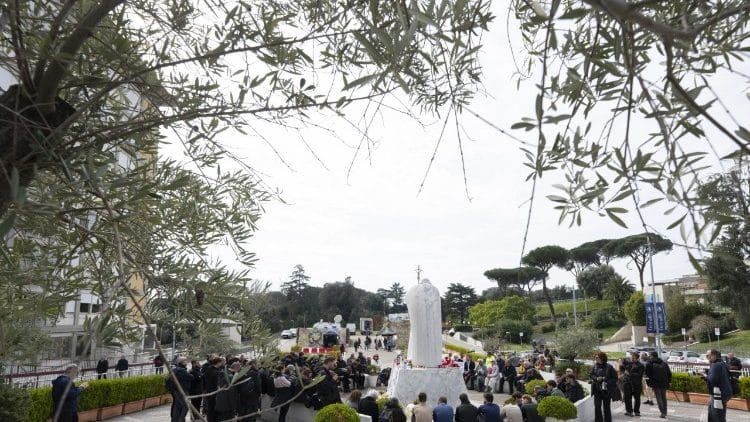
Pope at Gemelli Hospital: Peaceful Night
Exaudi Staff
12 March, 2025
1 min
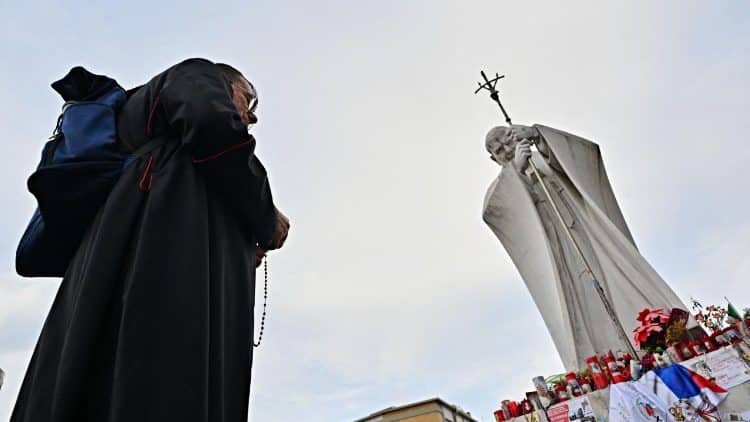
Pope at Gemelli Hospital: Slight Improvement
Exaudi Staff
11 March, 2025
1 min
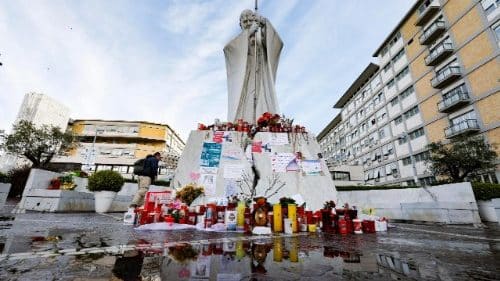
Pope Francis spent a peaceful night at the Gemelli Polyclinic
Exaudi Staff
11 March, 2025
1 min
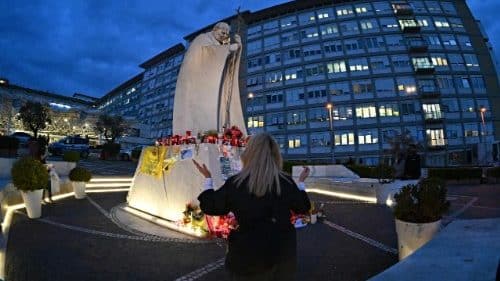
Pope Francis shows stable improvement
Exaudi Staff
10 March, 2025
1 min
 (EN)
(EN)
 (ES)
(ES)
 (IT)
(IT)

